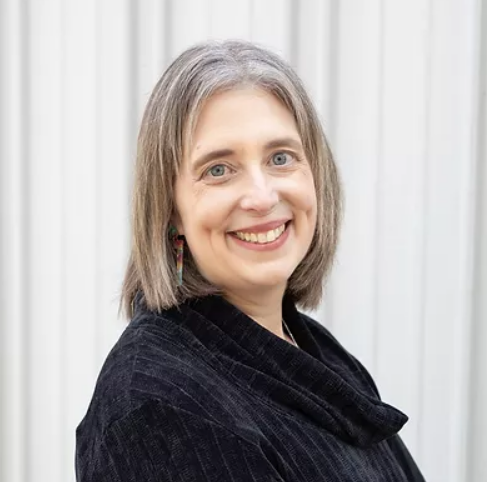The Missing Link: Spirituality and Grief
/ Understanding Grief : Litsa

Today we have a guest post on a topic we think is so important, from our grief-friend and subject-matter expert Kate J. Meyer, MDiv., LPC. Kate is an ordained minister and licensed professional counselor working with bereaved clients in a hospice setting. She is the author of Faith Doesn’t Erase Grief, a book for Christian grievers to finally learn the truth of the both/and for healing, and the fiction novel The Red Couch. Both books are available at bookshop.org and wherever books are sold. You can follow Kate by subscribing to her website at katejmeyer.com and/or find her on Facebook and Instagram.
If you are reading this, you already know just how complicated this thing called grief is. You also know that there are many realities that serve to increase the complexity, such as limited bereavement leave from work, disenfranchised grief, and grief that results from a traumatic event, just to name a few. Thankfully, there is an increasingly louder voice fighting for grief to be more recognized and validated for the true impact it has. Within that positive trend, I am happy to note that more also continues to be learned and shared as to how people can treat their grief from a holistic perspective.
With one persistent, notable exception: the spiritual self.
Despite its growing recognition as a valid and needed avenue of treatment, holistic approaches have yet to make significant progress as it relates to addressing spirituality, and, especially in grief, this is a gargantuan missing link. The truth of the matter is that if we are to expect complete healing, we need to be able to do work within all areas of life, including the spiritual self. Whether or not you are religious, there is a spiritual component of your being from which you connect with the earth, with yourself, with others, and, depending on beliefs, with a divine being.
The spiritual self is also the place in which we find our meaning and purpose, which, as you well know, is a primary piece of life that requires rebuilding in grief. If a person’s spirituality is also tied to religion, then an added layer of work often needs to be addressed.
Two Tracks
The relationship a griever has with spirituality and grief tends to go one of two ways. Psychotherapist John Welwood brought attention to the first when he named the concept of a spiritual bypass, in which people use their spirituality to hide from or avoid their psychological needs. In other words, one’s spiritual or religious beliefs make it permissible to focus primarily, if not entirely, on spiritual needs or beliefs, to the detriment of psychological needs. If spirituality is the Missing Link in grief treatment, this approach swings the pendulum too far in the spiritual direction.
The other track, then, swings the pendulum completely to the other side. Here one focuses solely on the psychological occurrences and needs, and avoids the spiritual component. As already noted, however, the work of grief necessarily includes an awareness of one’s own spiritual, and religious when applicable, beliefs because it is often in grief that such beliefs undergo examination at minimum and, for some, significant change.
It is helpful when engaging in grief work to determine on which track you fall. Try to determine why you fall where you do, and consider if, perhaps, differently approaching spirituality and grief is the Missing Link to forward movement.

Both/And
As with other areas of grief work, exploring the spiritual side of grief is a time when the concept of either/or must be avoided, and both/and embraced. Grief must be approached from both the angles of psychology and faith. Grievers must engage the work both with others and alone. Pain must be both felt and released. More deeply, grievers wanting to fill the gap left by this Missing Link are encouraged to give themselves permission to explore both certainty and doubt, comfort and abandonment, and commitment to faith and a break from faith. Allowing for the both/and instead of forcing oneself to choose is one way grievers can extend themselves grace, and remove additional guilt some in the religious world might project onto them.
It is okay, I would go so far as to say it is necessary, to engage questions as they arise. After all, your world has been rocked and when that happens, the foundation on which your world is built needs to be investigated and cracks filled. Give yourself the gift of space and time to do so. Find safe people with shared beliefs who will allow you the room to ask the big questions, express doubt, and wonder about existence. Seek out leaders within your faith tradition who will engage you not in teaching, but in discussion based in compassion. You do not need to settle for less.
Conclusion
Spirituality is oftentimes the Missing Link that prevents grievers from moving forward as fully as possible. It can be messy when religion is thrown into the mix due to beliefs that dictate if/how a person incorporates psychology, how a person engages emotions, and/or if a person is even ‘allowed’ to engage their grief rather than simply rejoicing in what comes next, according to that faith tradition, for the person who died.
The truth that grievers know, though, is that hard doesn’t mean impossible. And messy? What about grief isn’t messy? It’s a terrible time in life to try to navigate questions of grief. Unfortunately, grief doesn’t care about timing, and it is a season in life when such exploration is common. Do what you can to fight against your impulse to avoid the important work. Take breaks. And seek out a community who will help you face it openly, honestly, and with grace.
Have experience navigating the messy world of grief and faith? Leave a comment down below. And you can connect by subscribing to her website at katejmeyer.com and/or find her on Facebook and Instagram.
We wrote a book!
After writing online articles for What’s Your Grief
for over a decade, we finally wrote a tangible,
real-life book!
What’s Your Grief? Lists to Help you Through Any Loss is for people experiencing any type of loss. This book discusses some of the most common grief experiences and breaks down psychological concepts to help you understand your thoughts and emotions. It also shares useful coping tools, and helps the reader reflect on their unique relationship with grief and loss.
You can find What’s Your Grief? Lists to Help you Through Any Loss wherever you buy books:





BJ December 6, 2022 at 2:38 pm
I lost my BFF to cancer. Losing a friend can put you in a different category than a family member. But as Aristotle said, “ What is a friend, a single soul in two bodies.” We were spiritual friends, shared unconditional love, enhanced each others life for 25 years and I became a better person. But moving forward with her has been difficult as waves of grief have surrounded me with reminders, memories and loss. How does one carry forward the gifts of kindness and good left on a broken heart? Faith is carried by God through us, Spirituality is a connection of the soul now missing a portion in need of healing. Grief is emotions and feelings that live in the past and if we let go will forget our loved one? I want to treasure her, laugh at the memories, carry forward the gifts and recreate the me that us now meant to be 💕
Lula S October 12, 2022 at 9:09 am
I am so blessed by reading your comments because it helps me in my grief. I am 85 years old and 4 days before our 65th wedding anniversary and 3 days after my husband was taken to the hospital he was dead. Facing my new reality is difficult because I have to figure out me without him. This was 1 year ago 10/15/22.
Patricia Cole October 24, 2022 at 12:18 pm
Hi Lula,
Thank you so much for sharing. I am glad you have been able to find community and support through sharing your story with fellow readers. I am sorry to hear of the loss of your husband and I admire your vulnerability. Please take what you need from our page and resources and know we are here to support every step of the way.
Della Helmick September 21, 2022 at 12:32 pm
When my husband died I was extremely angry with God! How could he do this to us (me) it took a lot of soul searching, which lead to reading/researching comparative religion’s (this helped me).
We’re back on good terms now 😃 but honestly it took quite awhile to get there
Cindy August 29, 2022 at 7:49 pm
I have had terrible issues with
grief and faith. I have been angry with God for a long while now. I even scream “I hate you” at the top of my lungs sometimes. I constantly ask “Why would you do this to me?” He knows our heart. He had to have known taking my son from me would devastate me. He was my whole world, my best friend, my soulmate, my everything. 14 years ago after I divorced his dad, I committed the remainder of my life to care for my son who was autistic. I gave up everything and everyone. It was just me and my son against the world. We were settled and happy just living our lives. I gave it my all. I was the best mom I could possibly be. I loved him unconditionally and he did the same. We spent every day together. He was MY WHOLE WORLD!! Then one day out of the blue, God just took him from me. Now, I am lost, grieving alone as I have no one else. NO ONE.
Why would God just dump me in this empty desert with no one??? How could He love me and make me hurt and suffer so badly?? There is no answer and no answer would be good enough. This cant be reasoned away with Bible verses and “God has a plan.” It cant be “restored.” Nothing is worth living for or waiting for without my son. Like I said, God had to have known what this would do to me but He still allowed it.
I am just so angry. I want to die rather than face this pain every single day for the rest of this life I am forced to live. The way forward seems empty and hopeless.
I beg God every day to help me to release this bitterness. I ask Him every day to restore my strength and courage to be able to face this. Its been a year and I am still waiting. I thank Him every day since my son was born and now taken away, for every minute I had him, for everything he taught me, for how much he loved me, for the happiness he brought me. All of which I am desperately missing. How does God expect me to keep going without him?? I dont understand.😞
JP September 17, 2022 at 6:20 am
Dear Cindy,
God does not expect you to be alone, He is with you. He wants you to focus on Him, to be the center of your attention. He blessed you with your Son, just not forever. Try to be thankful for the time you had with your Son and ask God what comes next. He may have someone out there you are supposed to be an example for…someone who will be going through the same thing (a loss) whom you will be able to comfort. I too am asking what comes next and I praise God because He does have a plan. It is good God has this under His control because we can’t even achieve world peace. I find comfort in the fact life is not out of control that there is a plan that God knows what I need better than I myself do (as much as I rebel against that) and He loves me and wants what is best for me. Did my daughter think peas were better for her at dinner time than candy? No, she did not. Am I going to stomp off to my room and slam the door? Lord, help me to respond better than that! Thinking of you Cindy, with love
JP
CK September 27, 2022 at 11:20 am
I feel this way also. “Give thanks in everything ” is very difficult for me to do in regards to my son’s death.
Beth OBrien August 29, 2022 at 1:01 am
I am so looking forward to reading Kate’s book. In my experience working with people who are dying I often have to explain that it is OK to say the word spiritual if you are not a person who is religious. Equally it is OK to be a person of faith and it doesn’t have all the answers for your end journey. When someone says they aren’t spirtual, I say pick another word that speaks to the essence of you outside of your physical body, maybe its the connection to nature, to animals, to seeing the value in love, then they ponder maybe they are spiritual. Great topic Kate, go well.
Cherie August 26, 2022 at 10:28 am
I find it offensive when people say to “ask Jesus to heal your grief.” I feel they are often uncomfortable with my grief & using “faith” to silence me. What I want to say back to them (but refrain from doing) is “what the $&%# do you think I’ve been doing the past 3+ years?” I mean, seriously, responding/commenting that way is incredibly thoughtless & insensitive.
Judy. Bone September 18, 2022 at 6:38 am
Most of the people in my life that I have truly really loved and cared about in my life have died I lost a child tragically and suddenly in 2002 I have difficulty not looking Back and covering myself in memories and memories too often having difficulty moving forward day by day with optimism I have many friends but their lives are filled with family and find difficulty finding true deep connections at this older age in my life
JP August 22, 2022 at 7:49 pm
I have experienced grief and I am a woman of faith. My basic understanding of life and death is according to my belief in God and that He gives us life and a determinant number of days. I understand after death comes the judgement. I still grieved the loss of my husband. I still had to adjust to missing his companionship. I still have to work to pay my bills. But, I know my heavenly Father is Good, He knows what is best for me And He has a plan. Knowing that is a huge comfort. That death is not willy nilly that God has a purpose and a plan. I give all praise to God that He strengthens me when I am weak, when I feel I can’t go on. That He strengthened me through that horrible first day of loss and the second and He will continue to until I breathe my last. It’s a huge comfort…I don’t know how people make it through this without God.
Leigh G August 22, 2022 at 3:10 pm
When my daughter died (by suicide), I was thrown into a spiritual world, half here on earth and half across the veil. I had no choice- it just happened. I consider myself fortunate as I see others who suffer immensely after a child’s loss. I had a period of grace and was filled with compassion. Perhaps it was spiritual bypassing but I miss it now that it has faded (it’s been 5 and 1/2 years). I am on a spiritual journey now as I was given a taste of what divine love feels like. Many signs from my daughter helped me.
Fiona Williams August 22, 2022 at 1:20 pm
‘Winter of the heart’ by Paula Darcy is a precious and tiny book related to this. In fact any YouTube films or books of hers I read/watch again and again. Contemplative practice has been a gift in my pain.